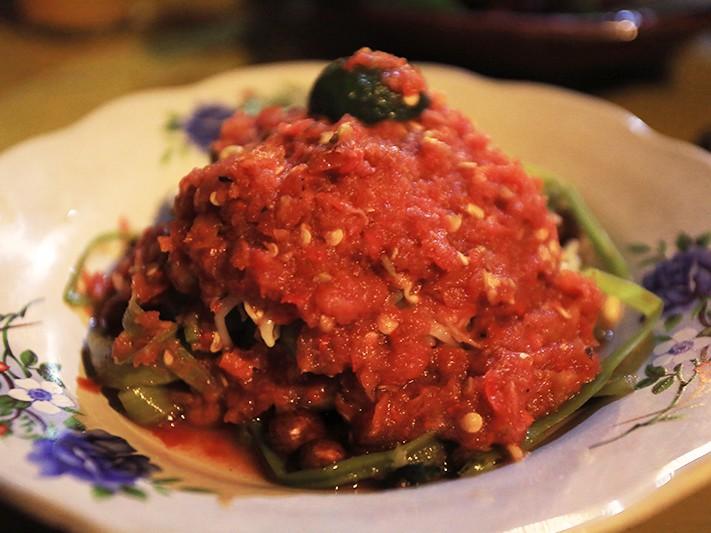
Exploring Lombok’s Culinary Tapestry: Savory Plates and Island Flavors
Lombok, an island adjacent to Bali, boasts a culinary landscape as diverse and rich as its landscapes. Let’s embark on a delectable journey through Lombok’s unique plates, where traditional recipes and fresh island ingredients come together to create an unforgettable dining experience.
Sasak Delicacies: A Glimpse into Lombok’s Culinary Heritage
The Sasak people, the indigenous inhabitants of Lombok, have preserved their culinary heritage, offering a unique array of dishes. Dive into the flavors of Ayam Taliwang, a spiced and grilled chicken dish, or Plecing Kangkung, a water spinach salad with a chili-tomato sambal. These Sasak delicacies provide a genuine taste of Lombok’s cultural identity.
Seafood Extravaganza: Fresh Catches from Lombok’s Waters
Lombok’s coastal location ensures an abundance of fresh seafood. Indulge in a seafood extravaganza with grilled fish, calamari, and prawns at local beachside warungs. The Gili Islands, off the northwest coast, are particularly renowned for their seafood restaurants, offering a breathtaking seaside dining experience paired with the freshest catches.
Pepe: Lombok’s Culinary Art Wrapped in Banana Leaves
Pepe, a traditional cooking method in Lombok, involves wrapping marinated fish, chicken, or tofu in banana leaves and grilling it to perfection. The banana leaves impart a distinct aroma and flavor to the dish, creating a delightful culinary experience. This unique cooking style showcases Lombok’s commitment to preserving traditional flavors.
Rujak Cuka: Lombok’s Tangy Fruit Salad
For a refreshing treat, try Rujak Cuka, Lombok’s version of a tangy fruit salad. This flavorful dish combines a medley of tropical fruits like mango, pineapple, and cucumber, dressed in a sweet and tangy palm sugar and tamarind sauce. Rujak Cuka captures the essence of Lombok’s tropical bounty in every delightful bite.
Lombok Coffee Culture: Sip and Savor Island-Grown Beans
Lombok’s coffee culture is burgeoning, with local coffee plantations producing high-quality beans. Explore the island’s coffee shops to savor a cup of Lombok’s finest brew. Pair your coffee with traditional sweets like Klepon or Dadar Gulung for a delightful combination of island-grown flavors.
Gule Tengkleng: A Flavorful Meat Stew with a Kick
Gule Tengkleng is a flavorful meat stew that showcases Lombok’s love for bold spices. Typically made with goat meat, this dish features a rich broth infused with turmeric, coriander, and candlenut. The result is a hearty and aromatic stew that embodies the robust flavors of Lombok’s culinary heritage.
Lombok’s Night Markets: Street Food Extravaganza
Exploring Lombok’s night markets is a must for any food enthusiast. These vibrant markets come alive in the evening, offering an array of street food delights. Sample grilled satay skewers, savory Martabak, and traditional desserts like Dadar Gulung as you immerse yourself in the lively atmosphere of these culinary hotspots.
Rinjani Veggies: Fresh Produce from Lombok’s Highlands
Lombok’s fertile highlands around Mount Rinjani produce an abundance of fresh vegetables. Local markets offer an array of organic produce, from vibrant greens to unique root vegetables. Enjoy a farm-to-table experience in Lombok by trying dishes that highlight the freshness of Rinjani veggies.
Sate Rembiga: A Spicy Twist on Indonesia’s Grilled Skewers
Sate Rembiga puts a spicy twist on Indonesia’s famous grilled skewers. This Lombok specialty features marinated minced meat, usually beef, grilled to perfection and served with a fiery sambal. The bold flavors of Sate Rembiga capture the essence of Lombok’s culinary scene, making it a must-try dish for spice enthusiasts.
In the midst of your culinary exploration in Lombok, be sure to check out additional insights and recommendations on Delectable Lombok Island Plates for the latest updates and exclusive dining experiences. Lombok’s culinary tapestry invites you to savor the unique flavors of the island, where each plate tells a story of tradition, local ingredients, and the warm hospitality that defines this tropical paradise.
